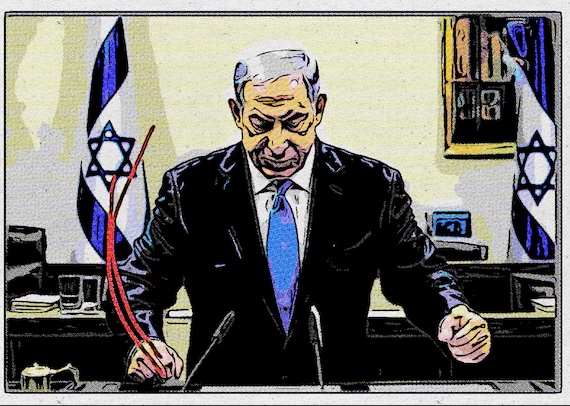Ann Arbor (Informed Comment) – Bilal Daher of the Israeli newspaper Arab 48 reports on Thursday evening’s knock-down, drag-out fight between Israeli Prime Minister Benjamin Netanyahu and his Defense Minister Yoav Gallant at the cabinet meeting, which ended in a vehement shouting match. The heated discussion was leaked to an Israeli television news channel.
Some members of the Israeli cabinet, such as Minister of Finance Bezalel Smotrich, have said that returning Israeli hostages from Hamas control is not a high priority for them, and it seems that PM Benjamin Netanyahu has joined their number.
The dispute centered on the negotiations led by the Biden administration on the release of Israeli hostages by Hamas in return for a ceasefire (which Netanyahu insists will be only temporary). Israel believes that some 104 hostages who were taken by Hamas on October 7, 2023 remain in the Strip, though not all may still be alive. There are an additional 4 Israeli soldiers who had been captured before last year, though two of those are thought to be dead.
Gallant gave a long report at the beginning of the cabinet meeting, in which he said that the talks on the release of hostages had reached a strategic crossroads for Israel. He warned that failure to reach an agreement at this juncture would incur risks beyond the loss of the hostages but could, in fact, lead to a regional war.
After midnight, Netanyahu sprang on his cabinet members his insistence that Israeli troops would remain in the Philadelphi Corridor just south of the southern border of Gaza at Rafah with Egypt, pounding the conference table and demanding an up-and-down vote by each cabinet member on the issue. The demand provoked an uproar, since the members had not been informed that there would be such a vote beforehand.
“Pounding the Table,” Digital, Dream / Dreamworld v3, PS Express, Clip2Comic, 2024.
Egypt’s position in the Philadelphi Corridor is authorized by the 1978 Camp David Peace Accords. Israel has nevertheless expelled Egyptian troops from the area and its troops are patrolling it themselves. Netanyahu has justified this move by announcing that the Israelis have found smuggling tunnels into Gaza from Egypt beneath the corridor. Egypt, however, said that it had long since collapsed those tunnels and that they are defunct.
Gallant is said to have objected to such a cabinet vote because it would tie the hands of the Israeli negotiators trying to achieve a hostage release.
Hamas leader Yahya Sinwar insists that the Israelis must withdraw from the Philadelphi Corridor before he will consider releasing the remaining Israeli hostages.Gallant pointed out that a cabinet decision to keep Israeli troops in the Philadelphi Corridor would essentially make Sinwar the decision-maker. If he refused to give in on this issue, and therefore kept the hostages, the Israeli government would have practically speaking foregone a key aim of the war effort, of returning the hostages.
Gallant allegedly said, “The choice is between staying in the Philadelphi Corridor and recovering the hostages, since it is not possible to have both. We will discover in the end that either the hostages will die or we will be constrained to reverse this decision.”
The Times of Israel quoted him from a leaked transcript as saying, “The significance of this is that Hamas won’t agree to it, so there won’t be an agreement and there won’t be any hostages released,”
TOI also quoted Gallant as accusing Netanyahu of having imposed his own strategic map of the corridor on the Israeli military.
Netanyahu objected, “I imposed? I imposed?”
Gallant retorted, “They had their own plan. You are running the negotiations by yourself ever since the war cabinet disbanded (in June). We learn of decisions only after the fact. The negotiators sketched the maps as you wanted, but they had a different position,”
The Israeli press is reporting that Chief of Staff Herzi Halevy and head of Israeli intelligence (Mossad), David Barnea expressed reservations about a formal cabinet decision on the issue, with Halevy warning that it was unnecessary and would pile up difficulties in an already complicated hostage situation: “The IDF will know how to enter and return to the Philadelphi Corridor at the end of the first six weeks of the ceasefire. There are enough constraints in the talks, you don’t need to add another.”
Barnea is said to have pointed out that the current negotiations were over establishing a firm list of remaining Israeli hostages and of those Palestinian prisoners that might be released as part of any deal, and that the Philadelphi Corridor was not even being negotiated about.
Netanyahu’s office denied that the two had reservations.
As Gallant and Netanyahu traded barbs, The Times of Israel reports, at one point Netanyahu openly said that he prioritizes staying in the Philadelphi Corridor over the release of the hostages. Gallant was allegedly shocked.
When Netanyahu’s friend Ron Dermer, the minister of “stragegic affairs” (propaganda), defended him, saying that the prime minister can do as he pleases, Gallant replied sarcastically that “the prime minister can indeed make all the decisions, and he can also decide to kill all the hostages.”
The other cabinet members allegedly rebuked the minister of defense for speaking this way to the PM.
Netanyahu pounded the table angrily and called the vote, and Gallant was the only one who voted “no.”
The only conclusion we can draw from all this is that Netanyahu’s participation in the hostage release negotiations has been a sham, that he isn’t interested in the fate of the hostages, and that he prioritizes further illegal occupation of land that does not belong to Israel over even a temporary peace. That President Joe Biden and Secretary of State Antony Blinken have put so much effort into these sham negotiations demonstrates that neither understands Netanyahu’s actual aims, or that they are being strung along.



 © 2025 All Rights Reserved
© 2025 All Rights Reserved